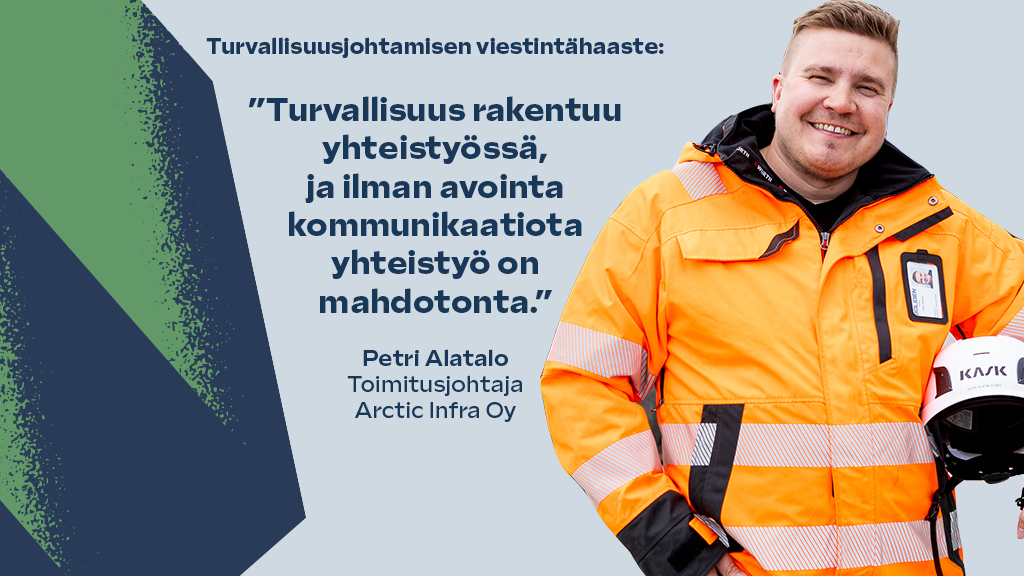A culture of open communication creates the courage to reveal hidden problems and challenges in the organization in good time. Arctic Infra's CEO Petri Alatalo's blog post is the seventh in a series where company management representatives reflect on what makes a safe and prosperous construction industry.

When problem situations can be tackled in time, it also has a great impact on overall safety and the further development of operations. A culture of transparency and open communication is not self-evident, but openness begins at the management level.
"Yes, there was a mistake. I guess today is the last working day."
Many employees may have experienced this situation. In the case of a mistake, you get a pile of hair and, in the worst case, the bastards are fired. There has been no place for defense and corrective measures, and the employee has only been made a frightening example to the work community. You don't dare to talk about things and mistakes are swept under the carpet. We live partly in an atmosphere of fear.
Softer values and diversity are emerging as trends in modern management. The increase in employee awareness has also encouraged the management to develop new operating models. One of them is creating a culture of open interaction.
Open communication is not a built-in skill for all of us Finns, and therefore different tools are needed to support the creation of an open culture. At Arctic Infra, we have an easy-to-use safety observation reporting system and an anonymous Whistleblower reporting channel for abuses.
The role of management in building an open culture
Management plays a key role in creating an open communication culture.
Unfortunately, it often happens that the management may think they are acting openly, but in reality the feedback of the employees is not heard or taken seriously. Developing open communication and safety requires management to commit to listening to employees and acting on the basis of feedback.
This doesn't just mean receiving nice feedback. Dealing with difficult issues is equally important. Open interaction requires maturity from both management and employees: the ability to give constructive criticism and the courage to accept it. This is critical so that the work community can grow and develop together, while creating an environment where everyone feels safe.
Everyone is responsible for safety and communication
Workplace safety is a community responsibility. Each of us bears responsibility for our own safety and the safety of others - but this also extends to communication. Open communication means that you dare to talk about things directly and honestly, both about problems and successes. Safety is built on cooperation, and without open communication, cooperation is impossible.
If even one person fails to report a dangerous situation they have observed or fails to follow the common rules of the game, the safety of the entire workplace can be compromised.
Since one small slip can have a wide impact on the entire work community, it is important that everyone feels it is their duty to be open and honest when communicating.
Safety is more than physical well-being
While physical safety – such as preventing accidents – is important, safety is also psychological. In a well-functioning work community, the employee feels mentally safe. He can trust that he will not be unfairly criticized, and he does not have to fear the reactions of superiors or colleagues. In a workplace where open communication works, you can talk about mistakes without fear and problems are dealt with constructively.
When everyone knows that their opinions are valued, they dare to express them better.
Open communication and a safety culture require maturity from the entire work community. It's about everyone being able to both give and receive constructive feedback. Creating such an atmosphere promotes the organization towards a common goal: a workplace where safety and trust are everyone's shared responsibility.
RT's safety group ended up challenging people working in management positions in the construction industry to share their own vision and experience about why safety must be managed, by what means, and what good it brings. Through the challenge, we want to send a message to the entire construction industry that good management plays a decisive role in promoting occupational safety and well-being.
Artic Infra CEO Petri Alatalo took up the challenge seventh.
Previous blog posts:
- The first challenge: Riku Patokoski, CEO of Bonava Suomi Oy
- Another challenge: Hartela's director of land acquisition and housing development, Johanna Palosaari
- The third challenge: Risto Kivi, Const's branch manager
- Fourth challenge: YIT's Infra segment manager Aleksi Laine
- Fifth challenge: Lujatalo CEO Mikko Hollmén
- Sixth challenge: Hannu Tuukkala, CEO of Consolis Parma
Write a comment